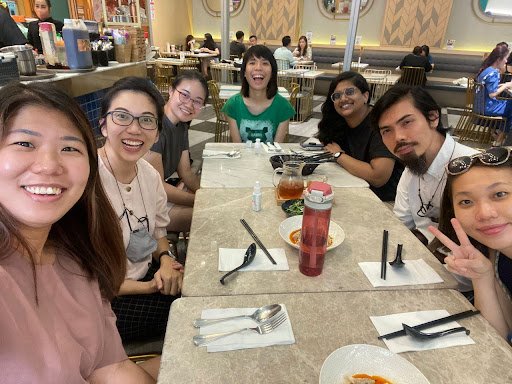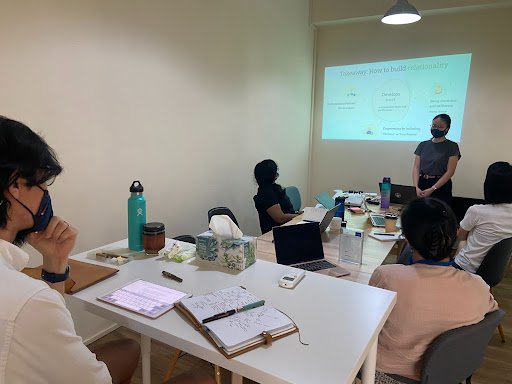Valuing People: Forging Trust Amidst Change and Uncertainty
Eleyn, a full-time NUS PPE undergraduate who loves her tea with 0% sugar, shares her reflection about her 3-month summer internship at Skillseed.
“You’ve joined us at a very exciting time…”
Indeed, times could not have been more exciting. Skillseed was ready to refresh its branding, and chart its course towards building trust-driven and collaborative communities. While I had dabbled in community-involvement projects with NGOs and the corporate world, Skillseed marked my first venture into combining community development with entrepreneurship. Being thrust into the centre of change since day one, I was eager to work with partners across the government, corporate and people sectors, within and beyond Singapore.
Still, one question lingered:
How would Skillseed maintain these relationships with partners from diverse sectors, especially in a time of change and uncertainty?
A core value at Skillseed is valuing people: Building a happy, purposeful and constantly learning team that would be reflected in external partnerships. It was through regular practices that Skillseed’s dedication to uphold this value shone through. Despite hectic schedules and the occasional public holidays, everyone makes an effort to prioritise the weekly SCRUM session that, besides work run-downs, facilitates emotional check-ins with ourselves and others. A simple “How are we feeling today?”, though resemblant of small talk, is no small matter when it provides a basis for navigating the week’s responsibilities together as a team. As someone who tends to prioritise work over emotions, these weekly check-ins were a welcome respite.
Valuing others, as I came to learn, begins with valuing oneself.
While working late-night sessions, my team members (thanks Raine!) reminded me to balance work with my emotional well-being. I’ll always be grateful for a few more hours of sleep the next morning, as well as the time-offs granted, which enabled me to be physically and emotionally present at work. In turn, the space to care for my mental well-being increased my mental bandwidth to juggle ad-hoc academic commitments with my Skillseed responsibilities. Thus, valuing people became a two-way process: As the Skillseed team valued my needs, I was then better able to add value to the team by working more efficiently.
Valuing people doesn’t stop at the emotional level, however. In Skillseed’s peer reviews, we often use “I wonder” as a way to respect others’ opinions as worth considering on par with our own suggestions; a way of respecting individual dignity. Using “us” instead of “you” contributes towards inclusivity in building a culture of collaboration, such that tasks become a team effort where everyone contributes their assets to a common goal / outcome.
One thing was clear on my first day when I received my internship portfolio: I wasn’t just an intern; I was part of the Skillseed family.
Team photo at the welcome lunch for new team members (including me)!
With my ideas encouraged, acknowledged and included in Skillseed’s projects, I also felt a greater sense of pride in contributing towards how “we”, as Skillseed, could grow. Respecting individual dignity, I realised, lays the foundation for building relationality.
Staying true to its mission of valuing people, the collective “us” driving Skillseed’s partnerships is apparent. Corporate, government and non-governmental organisations weren’t passive “customers”, “vendors” or “beneficiaries”; instead all were actively involved as “partners” with assets and needs for us to work with, together. Underlying all partnership models was this belief: Partnership is a synergy of both parties’ strengths, a process where both sides learn and grow together.
With this, code-switching was not necessary for communication with different stakeholders, as I had previously assumed. Rather, it is the dedication to tailoring Skillseed’s programmes to suit our partners’ needs, that enhances relationality with them, in turn forging trust-driven relationships.
For example, we chose to use simpler English when communicating with the BEAM Foundation students as part of our Overseas Community Service-Learning Project (OCSP), not because they were from Thailand and Myanmar, but because we wanted us to better understand one another. Witnessing the growth towards more open and confident exchanges between BEAM students and SMU facilitators was heartwarming, convincing me of the potential for communicating without segregating.
How does Skillseed maintain these relationships with [diverse] partners?
It distils to a core value - valuing people. As much as partners may be professionally divided into sectors of expertise, we are all people with needs to be valued, individuals with assets to be tapped on, and changemakers to be empowered in partnership. As Skillseed works through the rebranding process, our promise to value the people will remain at our core - starting from ourselves first, to our internal team members and then our external partnerships. It is this unyielding commitment to upholding this promise that Skillseed asserts stability amidst change, and forges trust amidst uncertainty. It grew upon me that communication begins with relationality, and relationality in turn requires conscientious effort in valuing the needs and assets of everyone involved.
Though my internship with Skillseed draws to a close, what I’ve learnt resounds in what I continue to pursue - Philosophy, Politics and Economics. As much as these three were distinct academic disciplines, they all contribute towards promoting sustainable, cohesive communities. Similarly, at Skillseed, everyone is valued for who they are, and empowered to make a difference in their communities.
Eleyn sharing her end-of-internship experience and key takeaways with the team.


